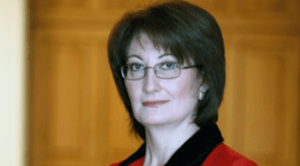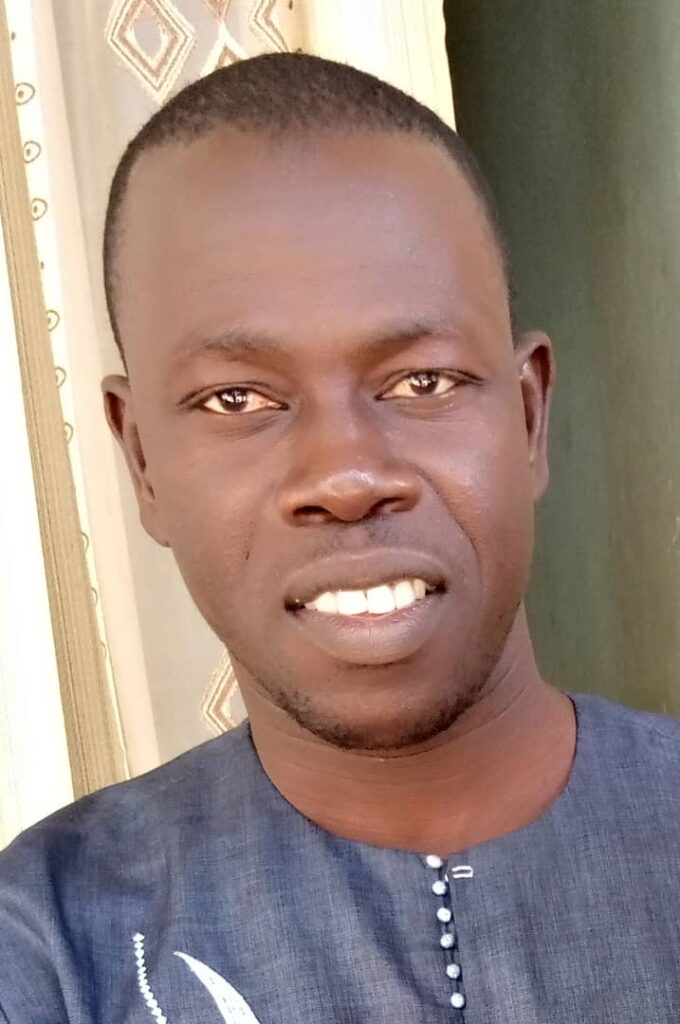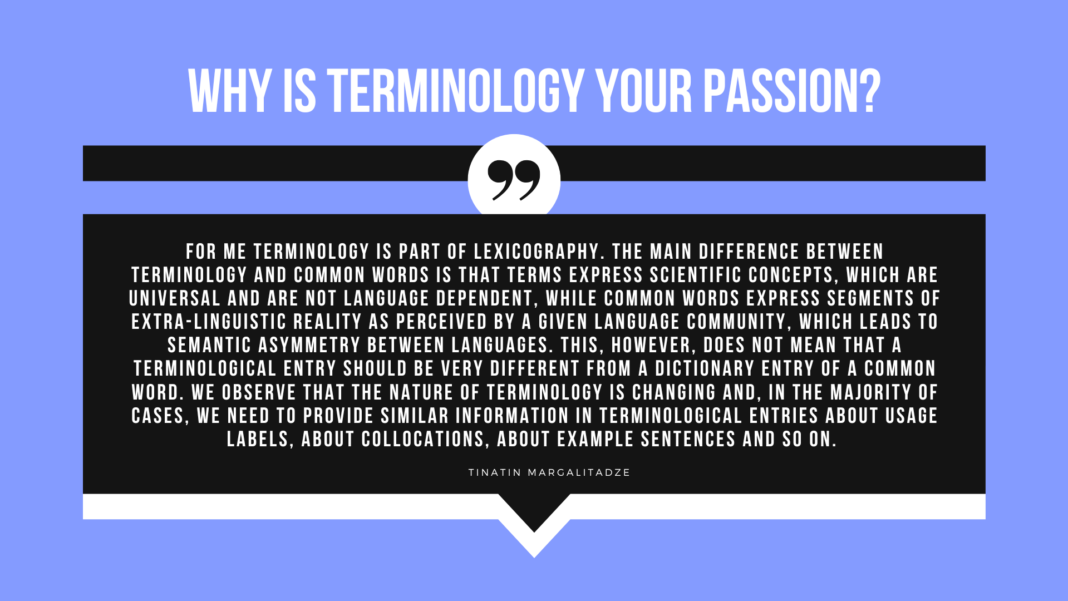
Tinatin Margalitadze studied linguistics and English at Ivane Javakhishvili Tbilisi State University. She did her postgraduate studies at the Chair of English Philology of TSU and in 1983 defended her candidate’s thesis (PhD) “Structural and Semantic Characterization of Adjectives in Modern English”. In 1989 she participated in Teacher Training Courses at the University of Surrey, Great Britain. In 1997 as a visiting scholar she spent one term at the Department of Linguistics, Cambridge University, Great Britain. In 2011 she was a visiting scholar at the University of Turin. Since 1985 one of the compilers, editors, then editor in chief and publisher of Comprehensive English-Georgian Dictionary (14 published volumes; online version – www.dict.ge, comprising 110 000 entries). One of the compilers and editor of English-Georgian learner’s Dictionary. Editor of English-Georgian Military Online Dictionary (10 000 entries http://mil.dict.ge), English-Georgian Biology Online Dictionary (23 000 entries http://bio.dict.ge) and English-Russian-Georgian Technical Online Dictionary (18 000 entries http://techdict.ge). In 2009 Tinatin Margalitadze launched MA and in 2011 PhD programs in lexicography at TSU. She is one of the initiators and organizers of Batumi International Symposia in Lexicography (the first symposium was held in May 2010, the second – in May, 2012). She is the organizer and chair of XVII EURALEX International Congress (Tbilisi, 2016) https://euralex2016.ge/.
Your domain of predilection is lexicography. What motivated you to study lexicography? Is it a passion for you? What are the characteristics of a good lexicographer?
Today I can state that I am a lexicographer and I am proud of this. I dedicated over three decades of my life and work to this field and, naturally, lexicography has become great passion of my life, which I try to transmit to my students at all three university levels.
What motivated me to become a lexicographer? I was invited as an editor of the English-Georgian dictionary material, compiled at the Department of English Philology of Ivane Javakhishvili Tbilisi State University in the 1980s. By that time I had already defended my Doctoral thesis in semantics and I believe that my research in semantics, more precisely, in the polysemy and polysemous models of words, paved my way to lexicography. At the end of my thesis I even had a dictionary entry model, based on my research.
Working on the English-Georgian dictionary material for years convinced me that lexicography is a special profession, which needs to be taught and studied as any other profession. I realized that knowledge of a foreign language was not enough for the compilation of a bilingual dictionary, which was the case in my country.
At the founding congress of EURALEX (European Master in Lexicography) in 1983, the British scholar John Sinclair raised the issue of setting up a master’s course in lexicography which would contribute to transforming lexicography from a practical activity into an academic discipline and would develop lexicography in close relation with information technologies, computer linguistics, general linguistics and lexicographic practice. I did not know these words of John Sinclair when in 2008 I started thinking about teaching lexicography. I began with the theoretical course at the BA level “Introduction to Lexicography”. In 2011 I launched MA module in lexicography within the MA program “English Studies” at Ivane Javakhishvili Tbilisi State University which was followed by a PhD module incorporated in the PhD program “Philology” at the same university.
In 2020 I moved to Ilia State University where, together with my colleagues, I founded the “Centre for Lexicography and Language Technologies”. I teach lexicography at Ilia State University as well. In 2022 Ilia University Press published my book for BA students “Introduction to Lexicography”. I completed the work on the MA program “Lexicography, Terminology and Language Technologies” which is undergoing an accreditation process at present and we hope to enrol students on this program from September 2022. At the doctoral level we developed a PhD module “Electronic Lexicography” which is a fourth module in the PhD program “Digital Humanities”. This program is already accredited and has doctoral students. From 2017 I cooperate with EMLex, European Master in lexicography, founded and run by a Consortium of European universities. Ilia State University is an associate member of the Consortium and I regularly teach lexicography to EMLex students.
What are characteristics of a good lexicographer? From my experience and point of view a lexicographer should be a good scholar, with good knowledge of theory and practice of lexicography, but a lexicographer should also be a broadly educated and creative person. Lexicography for me is a combination of scholarly and creative activities.
With the hegemony of English, many languages are in agony. What can be done to save them, given the importance of languages in institutions like the European Parliament but also worldwide given that each language represents a culture?
The Georgian language is influenced by the English language like many other languages of the world. This influence is not restricted to borrowings only and is very complex. I have been studying this issue since 2016 and dedicated an article to it entitled “Language and Ecology of Culture”, published in the scholarly journal Lexicographica, № 36 (https://www.degruyter.com/document/doi/10.1515/lex-2020-0012/html). Lexicography plays an important role in controlling and mitigating this influence. My study of the problem has revealed that one of the reasons of massive influence of English on Georgian is methods of teaching foreign languages, which greatly diminished the role of the native language in the process of teaching foreign languages. “It is genuinely puzzling how methods which explicitly condemn the use of the native language in the classroom, effectively banning bilingual dictionaries, could ever have been considered beneficial in the teaching and learning of foreign languages”. This quotation from the article by a Polish lexicographer Arleta Adamska-Sałaciak “Bilingual Lexicography: Translation Dictionaries” shows that this problem is not only the Georgian problem. Thus, from my observations, good dictionaries and methods of teaching foreign languages, based on academic bilingual dictionaries, may be one solution to this problem.
Are you familiar with terminology? If so, what is the difference between terminology and lexicography? Can the teaching of terminology and lexicography go hand in hand?
I am familiar with terminology. The Comprehensive English-Georgian Online Dictionary, published under my general editorship, contains terms from practically all fields of knowledge. Since 2010, our lexicographic team has compiled and published three terminological dictionaries: English-Georgian Military, Biology and Technical dictionaries. All these dictionaries are published online and are freely available to the general public. For me terminology is part of lexicography. The main difference between terminology and common words is that terms express scientific concepts, which are universal and are not language dependent, while common words express segments of extra-linguistic reality as perceived by a given language community, which leads to semantic asymmetry between languages. This, however, does not mean that a terminological entry should be very different from a dictionary entry of a common word. We observe that the nature of terminology is changing and, in the majority of cases, we need to provide similar information in terminological entries about usage labels, about collocations, about example sentences and so on. One of my students has compiled an entry for the Georgian term wine and described its collocations using over 30 Lexical Functions, given in the Combinatorial Explanatory Lexicology of Igor Melc’uk.
Can the teaching of terminology and lexicography go hand in hand? I have taught lexicography and terminology in one MA program for years and it has worked well. This experience is realized in the name of the new MA program of Ilia State University, mentioned above: “Lexicography, Terminology and Language Technologies”.
Terminology is not so developed in many countries. What is the situation in Georgia today and does it have a bright future in your country?
Terminology was a very well developed field in Georgia. Different scientific institutes under the aegis of the Academy of Sciences of Georgia, together with the terminological department of the Arn. Chikobava Institute of Linguistics of Georgia have produced monolingual, bilingual and multilingual dictionaries for practically all domains. During the Soviet Union majority of these dictionaries, for understandable reasons, were Russian-Georgian. The break-up of the Soviet Union and the troubled history of the country throughout the end of XX century and the beginning of XXI century has affected the development of many fields in our country, including the academic realm. But hopefully the country has recovered and there are institutions who work on terminology in our coutry: Arn. Chikobava Institute of Linguistics at Ivane Javakhishvili Tbilisi State University, Centre for Lexicography and Language Technologies at Ilia State University, translation centres at the Ministry of Foreign Affairs, Ministry of Justice of Georgia and some others.
Georgia is not yet a member of the European Union. If this were to happen, do you think it has the necessary human resources to prepare for the translation of the legislative corpus and to cover the needs when Georgian will become an official EU language?
After signing the Association Agreement with the European Union in 2014 Georgia started translation of many European documents into Georgian. There is already some experience accumulated in this regard, although there are many mistakes and errors in these translations, particularly in the translation of terminology. The aim of the MA program “Lexicography, Terminology and Language Technologies” is to educate young specialists with the knowledge of terminology who will have enough knowledge and skills how to work and deal with the above-mentioned documents.
As a lexicographer, you are certainly familiar with the IATE database. What do you think of it?
I first heard about IATE in 2014 in Bolzano, Italy, at the International Congress of EURALEX, where Thierry Fontenelle presented his keynote speech about this database. Since then I included this resource in my MA program and my lexicography students study this database and learn how to work with it. I think it is a very important terminological database.
The TermCoord Unit website is very dynamic and its content is always updated. Do you follow its evolution? Would you have any ideas for new sections or suggestions to improve it?
I have recently discovered this website and I am very happy about this. I am following it with great interest and hope to become an active partner of the TermCoord Unit with my students. Lexicography and terminology need promotion in many countries. Maybe you could add a section to the website which will aim at promoting lexicography internationally.
Have you ever thought of combining the teaching of lexicography and terminology in your projects? If so, why and how?
I have answered this question in sections 1 and 3.
What advice would you give to young people studying lexicography or terminology for their professional future?
They have to bear in mind that lexicography is a very important field for their country, as it is connected with their language, which, in its turn, determines and preserves their national identity. I would also tell them the words of Collison: “The spirit of nationalism has often proved a driving force in the making of dictionaries. Scholars were quick to recognize that the compilation of a reliable and comprehensive dictionary was one sign of the achievement of their country’s maturity, just as the lack of grammars and dictionaries indicated the dominance of a foreign power or the weakness of a truly national feeling”.

Interviewed by Bassene Landing
Landing holds a degree in English Literature and Documentary Information Sciences (library, archives, documentation) from Cheikh Anta Diop University in Dakar. He is currently pursuing a Master’s degree in Learning and Communication in Multilingual and Multicultural Contexts at the University of Luxembourg. He has worked as a copy editor for a daily newspaper in Senegal and speaks French, English and some Italian.

